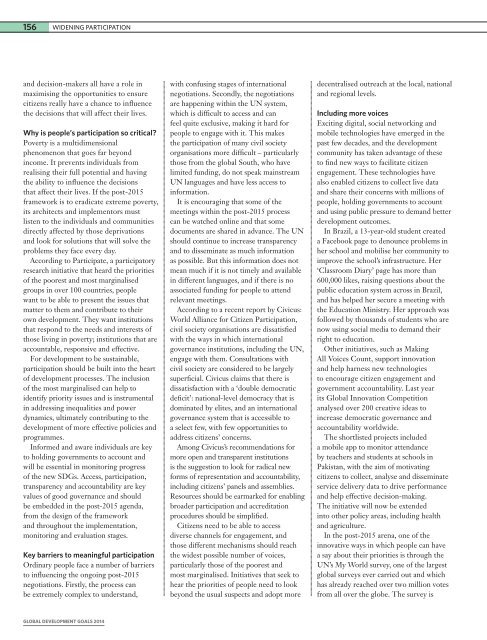FAMBB
FAMBB
FAMBB
You also want an ePaper? Increase the reach of your titles
YUMPU automatically turns print PDFs into web optimized ePapers that Google loves.
156 WIDENING PARTICIPATIONand decision-makers all have a role inmaximising the opportunities to ensurecitizens really have a chance to influencethe decisions that will affect their lives.Why is people’s participation so critical?Poverty is a multidimensionalphenomenon that goes far beyondincome. It prevents individuals fromrealising their full potential and havingthe ability to influence the decisionsthat affect their lives. If the post-2015framework is to eradicate extreme poverty,its architects and implementors mustlisten to the individuals and communitiesdirectly affected by those deprivationsand look for solutions that will solve theproblems they face every day.According to Participate, a participatoryresearch initiative that heard the prioritiesof the poorest and most marginalisedgroups in over 100 countries, peoplewant to be able to present the issues thatmatter to them and contribute to theirown development. They want institutionsthat respond to the needs and interests ofthose living in poverty; institutions that areaccountable, responsive and effective.For development to be sustainable,participation should be built into the heartof development processes. The inclusionof the most marginalised can help toidentify priority issues and is instrumentalin addressing inequalities and powerdynamics, ultimately contributing to thedevelopment of more effective policies andprogrammes.Informed and aware individuals are keyto holding governments to account andwill be essential in monitoring progressof the new SDGs. Access, participation,transparency and accountability are keyvalues of good governance and shouldbe embedded in the post-2015 agenda,from the design of the frameworkand throughout the implementation,monitoring and evaluation stages.Key barriers to meaningful participationOrdinary people face a number of barriersto influencing the ongoing post-2015negotiations. Firstly, the process canbe extremely complex to understand,with confusing stages of internationalnegotiations. Secondly, the negotiationsare happening within the UN system,which is difficult to access and canfeel quite exclusive, making it hard forpeople to engage with it. This makesthe participation of many civil societyorganisations more difficult – particularlythose from the global South, who havelimited funding, do not speak mainstreamUN languages and have less access toinformation.It is encouraging that some of themeetings within the post-2015 processcan be watched online and that somedocuments are shared in advance. The UNshould continue to increase transparencyand to disseminate as much informationas possible. But this information does notmean much if it is not timely and availablein different languages, and if there is noassociated funding for people to attendrelevant meetings.According to a recent report by Civicus:World Alliance for Citizen Participation,civil society organisations are dissatisfiedwith the ways in which internationalgovernance institutions, including the UN,engage with them. Consultations withcivil society are considered to be largelysuperficial. Civicus claims that there isdissatisfaction with a ‘double democraticdeficit’: national-level democracy that isdominated by elites, and an internationalgovernance system that is accessible toa select few, with few opportunities toaddress citizens’ concerns.Among Civicus’s recommendations formore open and transparent institutionsis the suggestion to look for radical newforms of representation and accountability,including citizens’ panels and assemblies.Resources should be earmarked for enablingbroader participation and accreditationprocedures should be simplified.Citizens need to be able to accessdiverse channels for engagement, andthose different mechanisms should reachthe widest possible number of voices,particularly those of the poorest andmost marginalised. Initiatives that seek tohear the priorities of people need to lookbeyond the usual suspects and adopt moredecentralised outreach at the local, nationaland regional levels.Including more voicesExciting digital, social networking andmobile technologies have emerged in thepast few decades, and the developmentcommunity has taken advantage of theseto find new ways to facilitate citizenengagement. These technologies havealso enabled citizens to collect live dataand share their concerns with millions ofpeople, holding governments to accountand using public pressure to demand betterdevelopment outcomes.In Brazil, a 13-year-old student createda Facebook page to denounce problems inher school and mobilise her community toimprove the school’s infrastructure. Her‘Classroom Diary’ page has more than600,000 likes, raising questions about thepublic education system across in Brazil,and has helped her secure a meeting withthe Education Ministry. Her approach wasfollowed by thousands of students who arenow using social media to demand theirright to education.Other initiatives, such as MakingAll Voices Count, support innovationand help harness new technologiesto encourage citizen engagement andgovernment accountability. Last yearits Global Innovation Competitionanalysed over 200 creative ideas toincrease democratic governance andaccountability worldwide.The shortlisted projects includeda mobile app to monitor attendanceby teachers and students at schools inPakistan, with the aim of motivatingcitizens to collect, analyse and disseminateservice delivery data to drive performanceand help effective decision-making.The initiative will now be extendedinto other policy areas, including healthand agriculture.In the post-2015 arena, one of theinnovative ways in which people can havea say about their priorities is through theUN’s My World survey, one of the largestglobal surveys ever carried out and whichhas already reached over two million votesfrom all over the globe. The survey isGLOBAL DEVELOPMENT GOALS 2014


